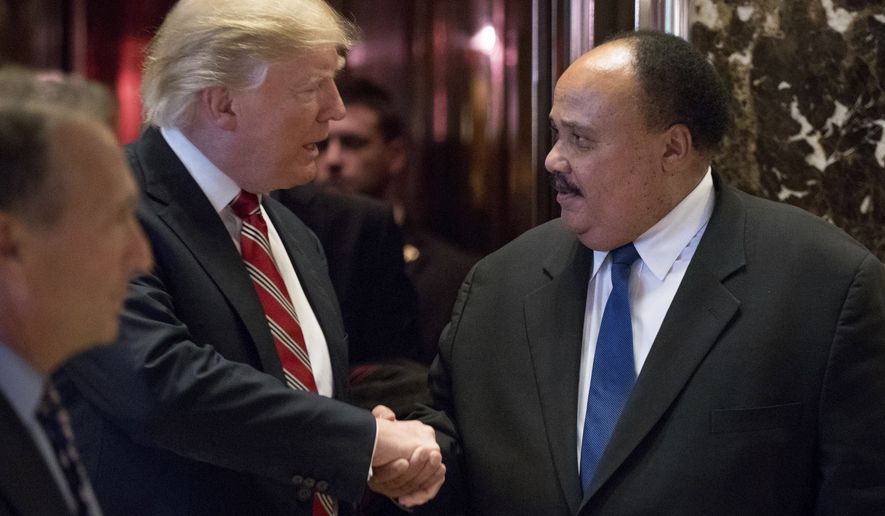OPINION:
The Republican Party – by in large – have blown it with the African American community.
Every GOP president-elect, or nominee, promises to make inroads with the population, and yet, give up once in office.
Maybe it’s because the Democratic Party has held a stronghold on black support.
They’ve racked up at least 80 percent of the African American vote in every presidential election since 1964, and many political scientists consider the African American vote “captured,” and unlikely to change, according to an editorial by Daniel Henninger in the Wall Street Journal.
“Black Americans appear—as a political issue—on every presidential candidate’s must-do list. But after the voting stops, they generally drop down or off the list. Four years later, the same people are living in the same neighborhoods with the same disordered schools and the same dim prospects for economic advancement,” Mr. Henninger writes.
But it doesn’t have to be this way.
By in large, Mr. Obama’s policies have failed African Americans - crime rates in urban centers like Chicago have skyrocketed, wages are stagnant, education and job prospects are still depressed after eight years. The racial wealth gap is growing.
Hillary Clinton could have won the White House had the black community come out for her in areas like Detroit, and yet many chose to stay home.
This is where president-elect Donald Trump has a real opportunity.
Yes, his Twitter sparring with civil rights icon Rep. John Lewis doesn’t do him any favors – but if he can start delivering on real results – like crime reduction, education and jobs – all of those words will fall to the wayside.
Unlike, Mr. Obama whose rhetoric was inspiring, Mr. Trump may be able to deliver something to the black community he was unable – economic hope, with real tangible results.
During the campaign season, Mr. Trump visited Detroit, in a trip arranged by his now Housing and Urban Development Cabinet pick Ben Carson.
“Today, I’m here to listen,” Mr. Trump told the Great Faith International Ministries church in September. “I mean it from the heart.”
Mr. Trump vowed to bring back jobs to the ailing city, and better the education of the children who lived there. He visited the Cleveland Arts and Social Sciences Academy, a charter school in a crime-ridden neighborhood, and pledged economic advancement, beginning with a good high school education.
“When I see wages falling, people out of work, I know the hardships this inflicts and I am determined to do something about it. I will do something about it,” Mr. Trump promised. “I do get things done, I will tell you. I’m going to get things done.”
Reducing crime in urban centers is the first place to start – because if people don’t feel safe, they can’t achieve in school or in their profession.
Mr. Trump recognizes this.
In a speech in Charlotte, North Carolina in October, Mr. Trump proposed a “new deal for black America,” where he promised “safe communities, great education and high-paying jobs,” in that order.
On the education front, Mr. Trump’s nomination of charter-school advocate Betsy DeVos is a good start.
Ms. DeVos hails from Michigan, where she is a charter school pioneer. The teachers unions’ view her nomination as an existential threat to their existence, which is a good thing – because the success of our public schools should be measured by student accomplishment, period.
And Ms. DeVos is delivering results.
Students in Detroit charter schools are performing better than their traditional public school counterparts in every subject, according to a recent analysis by the Michigan Association of Public School Academies. Meanwhile, Detroit’s charter school pupils’ are receiving two months’ additional learning in math and reading a year, compared to their public school peers, studies by Stanford University found.
Mr. Carson’s nomination as HUD Secretary is also encouraging.
In his confirmation hearing last week, Mr. Carson pledged to work on behalf of the African American community, and spoke at length of his struggles being raised in Detroit, by a single mother with less than an elementary school education.
Perhaps, the most pointed exchange in the hearing came when Sen. Thom Tillis, a Republican from North Carolina asked the retired neurosurgeon what he thought was “the best possible thing we can do for someone on government assistance.”
“Get them off of it,” Mr. Carson confidently, and calmly replied.
Exactly.
End the cycle of government dependence. Return the dignity, purpose and meaning that comes with having a job.
This is where Mr. Trump will have to deliver.
Mr. Trump’s already condemned and singled out specific industries for shipping their jobs to Mexico – and is seeing some results, particularly in the state of Michigan.
Ford Co. decided to scrap its plant in Mexico, and invest in Michigan – a move that will add 700 new jobs in the state. Fiat Chrysler announced this year a $1 billion plan to build three new Jeeps and a Ram pickup, now produced in Mexico, back to the U.S., adding 2,000 new jobs in Michigan and Ohio.
Who knows if Mr. Trump can stem the automotive trend of outsourcing south of the border, but at least he’s making the effort, and creating some hope and change, however minor, in the meantime.
“Too many African-Americans have been left behind,” Mr. Trump said in Charlotte back in October, telling them they’ve made the mistake of “electing the same people over and over.”
“Whether you vote for me or not, I will be your greatest champion,” he promised.
Only time will tell if Mr. Trump delivers on that promise – but if he can, some wounds may be healed, and some of his sins may be forgiven.
And he will have made more inroads with the African American community, than any of his GOP predecessors.




Please read our comment policy before commenting.